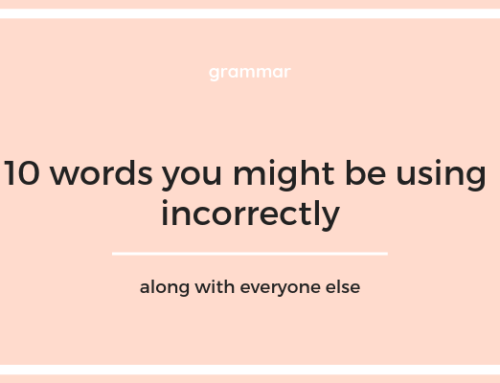The top mistakes I see when I’m editing
It’s difficult to get through the day without writing. Emails, texts, social media captions … we’re all writing more than ever before. Most of the time, it’s not a big deal when we spot a mistake, especially in texts and quick, informal emails. But how confident are you when you’re sending an email to your boss? Or, when you’re messaging a potential love interest? Sometimes, it’s critical that you write well. Your future may depend on it.
As a copyeditor, I spend a great amount of time searching for mistakes. I’ve discovered there are certain errors that are extremely common. Of course, we all make mistakes sometimes. I’ve typed “your” when I meant “you’re.” It’s not the end of the world. Nevertheless, it’s helpful to know if you’re making the same error every time.
1. Pronouns from hell.
Your and you’re, its and it’s, and they’re, their, there. Why is the English language so complicated? You probably already know how to correctly use all of these words. They’re just so easy to screw up — especially with autocorrect making decisions for you.
“Your,” “their,” and “its” are possessive pronouns.
It’s your life.
It’s their loss.
It’s up to us to keep grammar in its place.
“You’re,” “it’s,” and “they’re” are contractions. You’re eventually going to get this. It’s just a matter of time. They’re going to be so proud of you!
And “there” is mostly used as an adverb.
They’re looking at their kids over there.
There are many ridiculous grammar rules.
Here’s a hint that helps me when I’m editing: Read the contractions as two words and/or substitute the contraction when you’re unsure.
We tried to look directly at the sun, but its rays hurt our eyes. “It is rays hurt our eyes” is obviously wrong.
Your going to be sick of grammar rules soon. “You are going to be sick” works, so it’s “you’re” not “your.”
2. Peek, peak, and pique.
You play peek-a-boo. You sneak a peek in your neighbor’s window. You ask your boss to take a peek at your report.
You climb to the peak of a mountain. You peak in high school. You reach your sexual peak.
I see the phrase “pique your interest” often in business writing. I rarely see it written correctly. In this case, pique is a verb meaning “to stimulate or arouse.” It’s not “peek my curiosity” or “peak his interest.”
Pique can also mean irritate. I was piqued at the number of people who use the word “pique” incorrectly.
3. I LITERALLY can’t believe how many people use “literally” incorrectly.
But let’s be honest, most of us know it’s wrong and we do it anyway. For the dramatic effect.
I literally died of embarrassment. WRONG.
When we got home, the babysitter had turned on literally every light in the house. RIGHT.
My kids are literally making me crazy. DEBATABLE.
4. All together and altogether.
If you mean gather in a group, use “all together.” If you mean completely, entirely, or all things considered, use “altogether.”
Let’s get the dogs all together and have a play date.
It’s altogether stupid to have a doggy play date.
5. All right, alright (alright).
This one is easy. Always use “all right.” “Alright” is never correct (it’s not technically a word).
Don’t underestimate how essential outstanding writing is to the success of your business. Any content you produce should be engaging, original, and error-free. Don’t have a professional writer or copyeditor on your staff? Contact me to learn how I can help you produce polished, professional web content, blog posts, news releases, and other marketing materials for your company that will attract new business and boost brand awareness.




